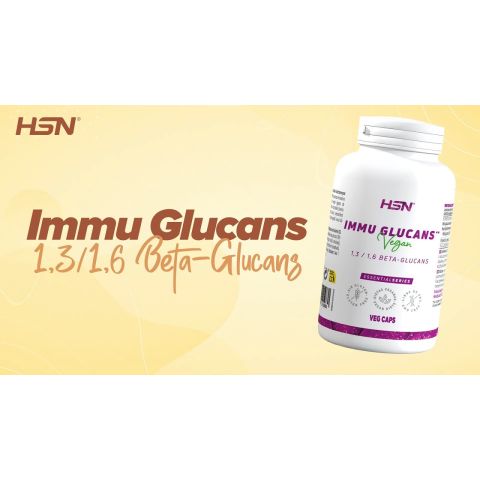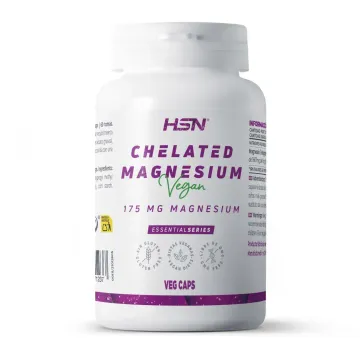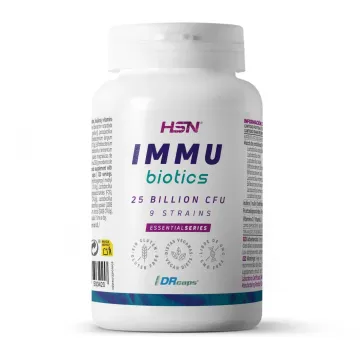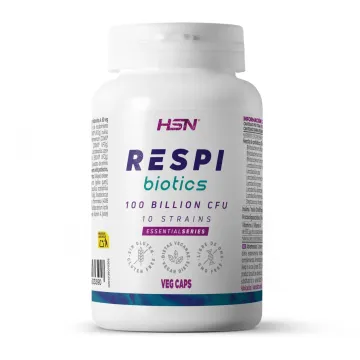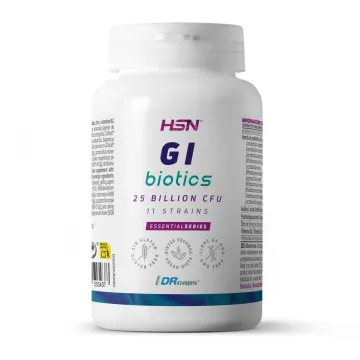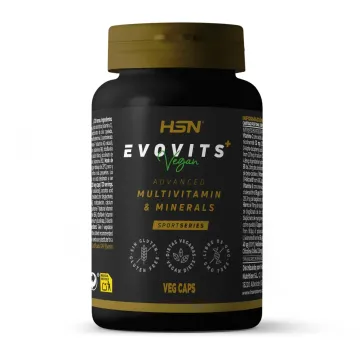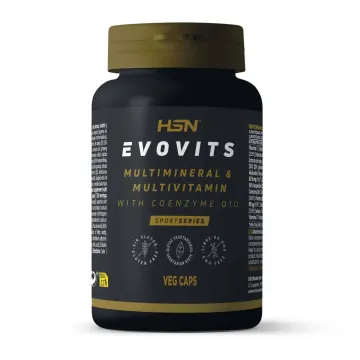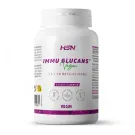- Beta-Glucans from baker's yeast (Saccharomyces cerevisiae)
- Mixed structure: 1,3/1,6 of Beta-Glucans.
- 75% assured Beta-Glucans 1,3/1,6 content.
- Raw material: WELLMUNE®.
- Gluten-free and free of Genetically Modified Organisms: Guaranteed.
- Treatment that ensures the total absence of residues: chitin and remains of the yeast cell wall.
- Beta-glucans of high molecular weight. The most studied for Immu Glucans.
- With vegetable vitamin D3 (lichen origin) and vegetable HPMC capsules (cellulose).
- Suitable for vegetarian and vegan, kosher and HALAL diets.
Immu Glucans (Wellmune®) for immune health

Immu Glucans by EssentialSeries is a food supplement in vegetable capsules made from a unique raw material: Wellmune®. It has been reviewed and approved for marketing by Europe's leading health and food safety experts; with vitamin D3.
Wellmune® is a patented Beta-Glucans from the yeast Saccharomyces cerevisiae, better known as baker's yeast, which generates a type of polysaccharide with a unique structure, combining a ß-1,3-glucan backbone and branched ß-1,6-glucan structure through alkaline-sensitive linkages.
Immu Glucans (1,3/1,6 Beta-Glucans) (Wellmune®) 250mg is product suitable for vegan diets.
We tell you the secrets of Immu Glucans
Beta-Glucans are polysaccharides of D-glucose monomers linked by ß-glucosidic bonds. In plants, algae, fungi and bacteria they form energy reserves and cell walls. Beta-glucans show a very diverse structure and scientific research reveals that, depending on the source of origin and the structure resulting from their processing, their biological activity also changes.
What this means is that when you've heard of beta-glucans, you've most likely been referring to beta-glucans from cereals, such as oats, which are well-known for their fibre properties.
However, these oat beta-glucans have a ß-1,4-glucan structure, which is not suitable for the product Immu Glucans, as they do not share the development objective of this food supplement.

The structure that has considerable scientific research to be considered suitable for the Immu Glucans product is 1,3/1,6; and this structural composition of beta-glucans is unique to yeasts, such as the baker's yeast used for the development of Wellmune®, the raw material used for the formulation of Immu Glucans.
But what are 1.3/1.6 Beta-Glucans?
They are beta-glucans, like those in oats, namely non-digestible polysaccharides composed of glucose monomers; however, their structure is different from oat beta-glucans.
Beta-glucans from baker's yeast are high molecular weight polysaccharides (100-200kDa), and differ from their cereal counterparts in that they contain ß-1,3/-1,6 glycosidic bonds, which gives them their unique nutritional properties.
The tertiary structure of the Saccharomyces cerevisiae glucan wall consists of glucose chains linked by 1,3-linkages and branched by 1,6-linkages forming a central composition linked to chitin and some mannoproteins. However, anything other than the beta-glucan structure is considered 'residue', not because it is a bad thing, but because it is removed during the processing process to obtain the purest of interest:
Pure Beta-glucans from baker's yeast with a high content of beta-glucans with 1.3/1.6 linkage.
Wellmune® raw material: A registered raw material with unique properties
Wellmune® is a researched, developed and innovation-driven raw material from the renowned manufacturer Kerry.
It is recognised as an ingredient of Beta-Glucans from baker's yeast treated according to a process protected by the developer, which has been brought to the attention of the European Food Safety Authority, for which it has been determined to be completely safe and free of risks and concerns by the EU Food Safety Panel.
Wellmune® has more than 13 scientific studies carried out and reviewed by experts who have investigated everything about the raw material: its processing, its absorption and metabolisation, its physiological properties in the body, its safety, and its dosage. Everything

At HSN we follow Kerry's recommendations and scientific studies that show what is the right amount to get the most out of the effects of yeast beta-glucans: 250mg.
250mg of Beta-Glucanos from Baker's yeast, of which 75% namely 187.5mg, are 1.3/1.6 Beta-glucans, is the recommended effective daily amount.
With Vitamin D3 (Cholecalciferol). Complementing the properties of yeast Beta-glucans
Immu Glucans is a formula clearly focused on the functioning of the immune system.
The key time to use this food supplement is during the winter season or during seasonal changes where the body's defences can be more vulnerable and exposed to climatic changes (such as cold, rain or snow).
Immu Glucans has a significant amount of Vitamin D3 which contributes to the normal functioning of the immune system.
The added vitamin D is in the form of D3 or natural cholecalciferol, which comes from a vegan source (lichen) and is provided in purified form.
Why do we highlight 'lichen'?
The most common (and cheapest) source of vitamin D3 is lanolin.
Lanolin is a fatty secretion of sheep, which naturally contains vitamin D, and which can be extracted with processing to present it as a pure vitamin.
This has no negative nutritional effect, in fact the vitamin D that is not suitable for vegans, such as our Vitamin D3 50000 IU, is derived from lanolin.
However, if yeast beta-glucans are suitable for vegan diets… Why make the product unsuitable for vegan diets because of vitamin D3 when we have options that, although more expensive to produce, also make the product suitable for everyone?
That is why we highlight lichen, because it is a micro-organism authorised as a safe source for the extraction of vitamin D, which it generates by itself through its internal synthesis processes, and which allows us to obtain a vitamin D3 with the same nutritional quality as lanolin, BUT SUITABLE FOR VEGANS.
Gluten-Free / GMO-Free. Free of allergens and unwated compouns!
Baker's yeast (Saccharomyces cerevisiae) has a 'problem' that can sometimes make it difficult to reconcile with all types of diets and dietary conditions, and that is that it contains gluten.
This yeast is widely used in food, especially in the fermentation process of bread and alcoholic drinks such as wine and beer, for which it is known by its common name.
Wellmune® is a raw material of beta-glucans extracted from baker's yeast, but Kerry's patented manufacturing process allows so much of the beta-glucans to be extracted, making the raw material such a high-quality product that the gluten in baker's yeast is completely isolated.
Immu Glucans is a product suitable for coeliacs, it does not contain gluten.

Furthermore, the baker's yeast used for the extraction of its beta-glucans does not contain genetically modified organisms - guaranteed - unlike many other raw materials on the market that do have them in their culture media to speed up production. At HSN we only use raw materials that involve natural development processes.
And finally: Wellmune® is a 100% beta-glucan ingredient, that is, other natural compounds in the Saccharomyces cell wall, such as chitin or mannoproteins, which are of no interest to us, are eliminated.
A 1.3/1.6 Beta-glucans raw material of the highest purity!
Immu Glucans (1,3/1,6 Beta-Glucans) (Wellmune®) 250mg is your best ally for your defences
Yeast beta-glucans 1,3/1,6 have a large number of scientific studies that review and validate their nutritional properties. It also has a positive safety assessment report from the committee of experts of the European Food Safety Agency:
Some prominent examples of these compounds in the scientific literature include:
- Fuller, R., Moore, M. V., Lewith, G., Stuart, B. L., Ormiston, R. V., Fisk, H. L., … Calder, P. C. (2017). Yeast-derived β-1,3/1,6 glucan, upper respiratory tract infection and innate immunity in older adults. Nutrition, 39–40, 30–35.
- De Marco Castro, E., Calder, P. C., & Roche, H. M. (2021). β-1,3/1,6-Glucans and Immunity: State of the Art and Future Directions. Molecular Nutrition and Food Research, 65(1), e1901071.
- Feldman, S., Schwartz, H. I., Kalman, D. S., Mayers, A., Kohrman, H. M., Clemens, R., & Krieger, D. R. (2009). Randomized phase II clinical trials of Wellmune WGP® for immune support during cold and flu season. Journal of Applied Research, 9(1–2), 30–42.
- Talbott, S. M., Talbott, J. A., Talbott, T. L., & Dingler, E. (2013). β‐Glucan supplementation, allergy symptoms, and quality of life in self‐described ragweed allergy sufferers. Food Science & Nutrition, 1(1), 90–101.
And Vitamin D, the famous 'sunshine vitamin', is a nutrient that could not be more researched nowadays, and in addition to being considered physiologically as a 'pseudohormone', we already know its essentiality, which determines that we must consume foods rich in vitamin D, and/or food supplements to cover the amounts we need since through internal synthesis by skin exposure to solar radiation we do not reach the requirements except, perhaps, in some parts of the world, during the summer months. HSN has some interesting reading on this subject:
The most relevant aspect of the effects of cholecalciferol in the product Immu Glucans is that the vitamin D contributes to the normal functioning of the immunitary system.
I want to prepare an invencible combo of 'Immu' products. No one can stop me this winter!
Heard by our experts! We leave you with a combination of products, completely complementary, that you can use simultaneously without adverse effects; unrivalled for your defences to be at 100%:
Immu Glucans + Immu Biotics 25B UFC + Seasonal change vitamins + Quercetin.
If you don't believe it: try and let yourself be surprised!
Expert tip:
At HSN we always share transparent and quality information: Food supplements require daily use for several weeks in order to verify their properties, namely, it is usually not enough to use a product for one or several days or just when you need its effects. We recommend that you anticipate the need to include an immune-boosting product in your daily food supplement stack by at least 4 weeks so that when you most need this support, your body is fully loaded with nutrients from products such as Immu Glucans.
Scientific References
- Talbott, S., & Talbott, J. (2009). Effect of BETA 1,3/1,6 GLUCAN on upper respiratory tract infection symptoms and mood state in marathon athletes. Journal of Sports Science and Medicine, 8(4), 509–515.
Talbott, S., & Talboh, J. (2010). Beta 1,3/1,6 glucan decreases upper respiratory tract infection symptoms and improves psychological wellbeing in moderate to highly-stressed subjects. Agro Food Industry Hi-Tech, 21(1), 21–24. - Talbott, S. M., & Talbott, J. A. (2012). Baker’s yeast beta-glucan Supplement reduces upper respiratory symptoms and improves mood state in stressed women. Journal of the American College of Nutrition, 31(4), 295–300.
- Fuller, R., Butt, H., Noakes, P. S., Kenyon, J., Yam, T. S., & Calder, P. C. (2012). Influence of yeast-derived 1,3/1,6 glucopolysaccharide on circulating cytokines and chemokines with respect to upper respiratory tract infections. Nutrition, 28(6), 665–669.
- Carpenter, K. C., Breslin, W. L., Davidson, T., Adams, A., & McFarlin, B. K. (2013). Baker’s yeast β-glucan supplementation increases monocytes and cytokines post-exercise: Implications for infection risk? British Journal of Nutrition, 109(3), 478–486.
- McFarlin, B. K., Carpenter, K. C., Davidson, T., & McFarlin, M. A. (2013). Baker’s yeast beta glucan supplementation increases salivary IgA and decreases cold/flu symptomatic days after intense exercise. Journal of Dietary Supplements, 10(3), 171–183.
- Mendes, M. M., Hart, K. H., Botelho, P. B., & Lanham-New, S. A. (2018). Vitamin D status in the tropics: Is sunlight exposure the main determinant? Nutrition Bulletin, 43(4), 428–434.
- Cashman, K. D., Dowling, K. G., Škrabáková, Z., Gonzalez-Gross, M., Valtueña, J., De Henauw, S., … Kiely, M. (2016). Vitamin D deficiency in Europe: Pandemic? American Journal of Clinical Nutrition, 103(4), 1033–1044.
 Before
Before After
After During
During Morning
Morning Afternoon
Afternoon Night
Night








